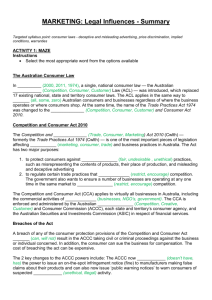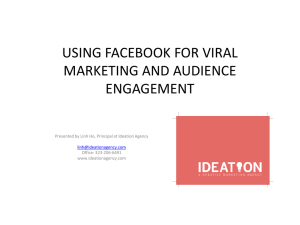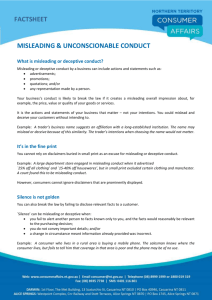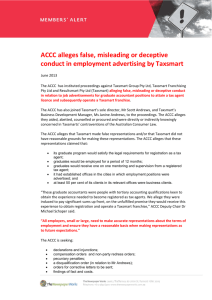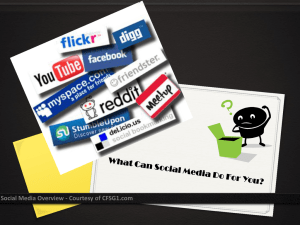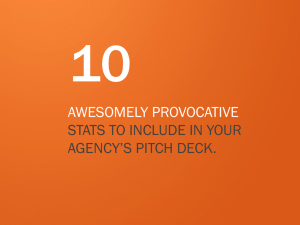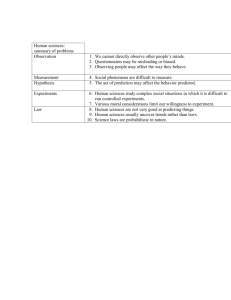Format for Project 6
advertisement
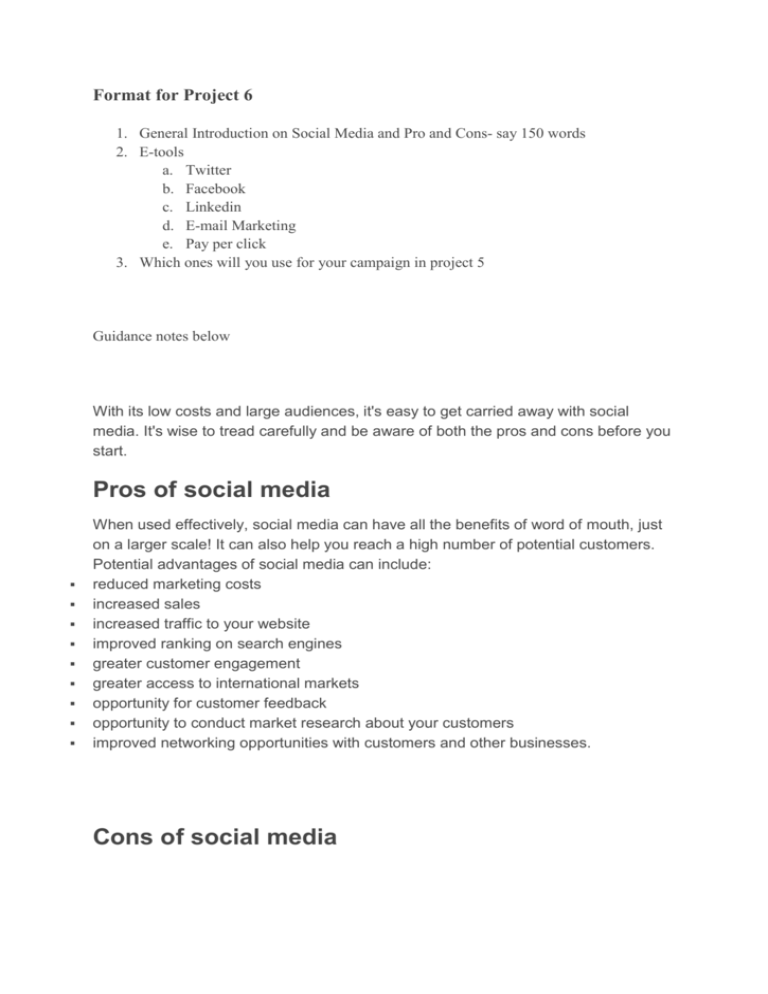
Format for Project 6 1. General Introduction on Social Media and Pro and Cons- say 150 words 2. E-tools a. Twitter b. Facebook c. Linkedin d. E-mail Marketing e. Pay per click 3. Which ones will you use for your campaign in project 5 Guidance notes below With its low costs and large audiences, it's easy to get carried away with social media. It's wise to tread carefully and be aware of both the pros and cons before you start. Pros of social media When used effectively, social media can have all the benefits of word of mouth, just on a larger scale! It can also help you reach a high number of potential customers. Potential advantages of social media can include: reduced marketing costs increased sales increased traffic to your website improved ranking on search engines greater customer engagement greater access to international markets opportunity for customer feedback opportunity to conduct market research about your customers improved networking opportunities with customers and other businesses. Cons of social media Social media may not be suited to every business. If you are unprepared and launch your social media presence without proper planning, you could waste valuable time and money. Some of the possible disadvantages you should be aware of are: Not having a clear marketing or social media strategy may result in reduced benefits for your business. Additional resources may be needed to manage your online presence. Social media is immediate and needs daily monitoring. If you don't actively manage your social media presence, you may not see any real benefits. Greater exposure online has the potential to attract risks. Risks can include negative feedback, information leaks or hacking. Whatever the risk, preparing your policy and procedures carefully beforehand can help you manage the risks. False or misleading claims made on your social media channels by your business or by a customer can be subject to consumer law. Customer fan posts and testimonials that are misleading or deceptive to other customers, particularly about competitor products/services may result in your business being fined. Benefits of social media If used wisely, social media can be a powerful business tool. Some of the opportunities and benefits of social media can include: Revenue The most obvious opportunity is to generate revenue. This can be done through building a community or advertising your products or services within the social media platform. If you choose to advertise in social media, the ads can either link back to your business' social media page or sometimes to your website. This can mean that you're able to benefit from social media without needing to have a channel. Brand development Using social media allows your customers to connect and interact with your business on a more personal level. If you already have an established brand, social media might be an opportunity to further develop your brand and give your business a voice. Attracting customers Social media can be a good way of attracting new customers. For example, when considering social media campaigns, you could try to attract followers with promotions or giveaways. Once you have a good following you can focus on more personalised social media campaigns to encourage them to stay. Research Even if you think social media is not suited to your business or that you don't have the time, simply logging on to see what your competitors are doing in this space, or finding out what your customers are saying about you might be a valuable exercise. Networking Networking can be a valuable way to exchange ideas with like-minded people to improve the way you do business. Using online networking sites can also be valuable to your business, often for the purpose of knowledge sharing and word-ofmouth referrals. Recruitment Some organisations use social media to advertise vacant positions. Job networking sites like LinkedIn are dedicated to the job market and can help you use networks to attract skilled people. Search-engine discoverability Your website's ranking in the search results of various search engines can sometimes be affected by the size and influence of your social network. As your social following grows, your visibility in search engines may also increase. This is a common Search Engine Optimisation (SEO) strategy. REWARDS OF USING TWITTER • Greater brand engagement • Getting good feedback form market • Better customer conversation • Faster communication and customer satisfaction • Building your brand as an expert • Greater outreach for your content • More leads and business REWARDS OF FACEBOOK AND CREATING CONTENT • You increase brand awareness • You can to have a voice in the conversation • You can influence opinions of your brand/product • Ever evolving area within digital • Salary scales are still being determined but rising • Big brands and small business are at the same level REWARDS OF LINKEDIN AND CREATING CONTENT • Brand awareness • You can to have a voice in the conversation • You can influence opinions of your brand/product • Ever evolving area within digital • Salary scales are still being determined but rising • Big brands and small business are at the same level REWARDS OF USING VIDEO MARKETING • Control your brands official video content • You can quickly respond to things • You can talk to you market directly – Crisis management • You can compete with the big companies • You can showcase your products in the best light • You can get a tonne of information across • Gain leads and referral traffic to your site – Video ads · Blogging · Microblogging · Search engine optimization · Social network participation (Facebook, LinkedIn) · Email marketing · Social media monitoring & outreach · Pay per click · Blogger relations · Video marketing · Social media advertising · Online/digital public relations · Affiliate marketing · Corporate web site · Viral marketing · Free content (eBooks, white papers) · Online communities/forums · Branded microsites · Webinars · Podcasts Social media Social media gives large and small businesses a direct way to interact with existing and potential customers, and promote their products and services. Businesses using social media channels like Facebook, Twitter and YouTube have a responsibility to ensure content on their pages is accurate, irrespective of who put it there. Don't make misleading claims on social media Don't allow others to make misleading claims in comments Minimise your risk Monitoring social media pages Responding to false, misleading or deceptive comments instead of removing them ACCC role in enforcement of social media Offer your customers a refund More information Don't make misleading claims on social media You must ensure you don't make any false or misleading claims as part of your marketing and promotional activities. This includes advertisements or statements using any media, including print, radio, television, websites and social media channels like Facebook and Twitter. There are no specific or different consumer laws or rules in place for social media. Consumer protection laws which prohibit businesses from making false, misleading or deceptive claims about their products or services have been in place for decades. These laws apply to social media in the same way they apply to any other marketing or sales channel. Examples 1. XYZ Pty Ltd tweets that they are the first Australian company to offer a 100 per cent environmentally friendly car wash service when they have not done any research to support this. It turns out that GHI Pty Ltd has offered the same service for many years. This tweet is likely to be false, misleading or deceptive. 2. ABC Pty Ltd pays a celebrity to tweet that she loved staying at one of ABC’s resorts. The celebrity has never actually been to this resort. This tweet is likely to be false, misleading or deceptive. Don't allow others to make misleading claims in comments You can also be held responsible for posts or public comments made by others on your social media pages which are false or likely to mislead or deceive consumers. In 2011, a court case concluded that a company accepted responsibility for fan posts and testimonials on its social media pages when it knew about them and decided not to remove them. Examples 1. A fan of XYZ Pty Ltd posts negative and untrue comments about a competitor’s product on XYZ’s Facebook page. XYZ knows that the comments are incorrect, but decides to leave the comments up on its page. XYZ may be held accountable for these comments even though they were made by someone else. 2. ABC Pty Ltd and DEF Pty Ltd are market leaders in the paint industry. A customer posts on ABC’s Facebook page that their paint always lasts much longer than DEF’s paint. ABC is unsure if this is true, but decides not to remove the post. It turns out that ABC’s paint does not last longer. ABC may be held responsible for this comment. Minimise your risk Don’t make statements on your Facebook or other social media pages that you wouldn’t make in any other type of advertising. If you’re unsure about what you can or can’t say, seek legal advice. Monitor your social media pages and remove any posts that may be false, misleading or deceptive as soon as you become aware of them. This is what the ACCC would expect you to do with any other type of advertisement. Establish clear ‘house rules’ that apply to the actions of your fans, friends and followers when using your social media pages. These rules should be featured prominently on your social media pages. You should then block users who breach those rules. Monitoring social media pages The amount of time you need to spend monitoring your social media pages depends on two key factors: the size of your company and the number of fans or followers you have. Businesses should keep in mind that social media operates 24 hours a day, seven days a week, and many consumers use social media outside normal business hours and on weekends. Examples 1. ABC Pty Ltd has 300 staff. As larger companies usually have sufficient resources and sophisticated systems, the ACCC would expect ABC to become aware of false, misleading or deceptive posts on its Facebook page soon after they are posted and to act promptly to remove them. 2. XYZ Pty Ltd has only 10 staff but more than 50,000 Facebook fans. Given the number of people who could be misled by an incorrect post on XYZ’s Facebook page, the ACCC would expect XYZ to devote adequate resources to monitoring its Facebook page and to remove any false, misleading or deceptive posts soon after they are posted. 3. DEF Pty Ltd has 12 staff and only 80 Facebook fans. As a small business, DEF is unlikely to have the same resources to dedicate to social media monitoring as a larger company would. Also, given the small number of Facebook fans, there is less potential for widespread public detriment from incorrect posts. Accordingly, the ACCC would not expect DEF to monitor its Facebook page as regularly as the companies in the two previous examples. Responding to false, misleading or deceptive comments instead of removing them You can can respond to comments instead of removing them, but it is possible that your response may not be sufficient to override the false impression made by the original comments. It may be safer to simply remove the comments. ACCC role in enforcement of social media The ACCC can require companies to substantiate any claims on their social media pages, and can take court action where it identifies a breach of the law (or issue an infringement notice in certain circumstances). While all complaints are carefully considered, the ACCC directs its resources to investigate and resolve matters in accordance with our compliance and enforcement priorities. The ACCC will take a proportionate response in relation to false or misleading comments on businesses’ social media sites. We are more likely to pursue cases of false, misleading or deceptive conduct if: there is the potential for widespread public detriment if the statement is relied on the conduct is particularly blatant it is by a business that has come to our attention previously. Offer your customers a refund You should offer a refund to any customer who made the decision to purchase your product or service based on a false, misleading or deceptive claim they saw on your social media page. Ref: http://www.business.gov.au/business-topics/business-planning/social-media/Pages/pros-and-cons-of-socialmedia.aspx http://www.accc.gov.au/business/advertising-promoting-your-business/social-media http://www.business.gov.au/business-topics/business-planning/social-media/Pages/benefits-of-socialmedia.aspx

